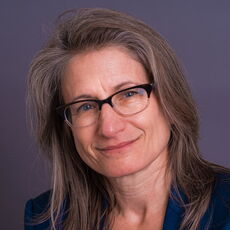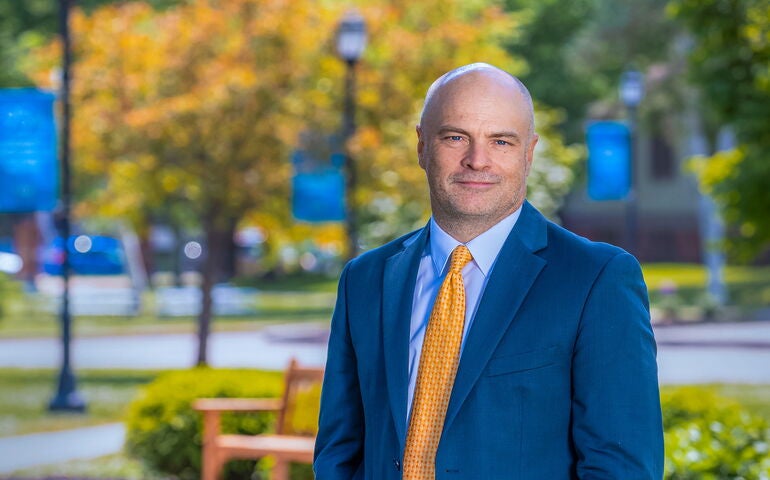
Processing Your Payment
Please do not leave this page until complete. This can take a few moments.
University of New England is on a hot streak with new business school, med school upgrades
 Photo / Tim Greenway
Norm O’Reilly will take over as the first dean of the University of New England College of Business, effective July 1.
Photo / Tim Greenway
Norm O’Reilly will take over as the first dean of the University of New England College of Business, effective July 1.
As the University of New England’s new College of Business prepares to host students in its first full year, its first dean, Norm O’Reilly, shares some highlights about the business school and what he hopes to accomplish.
O’Reilly joins UNE, effective July 1, with two decades of leadership experience in higher education, including his most recent role as dean of the Portland-based Graduate School of Business at the University of Maine.
Prior to coming to UMaine, O’Reilly was assistant dean of executive programs for the University of Guelph’s business and economics school, department chair for sports administration at Ohio University’s business college and the director of the sports administration school at Laurentian University.
“The chance to be a founding dean is something new,” says O’Reilly. “As much as it can be in the academic world, it’s a startup, which is great. I’m very excited about that.”
The UNE College of Business launched in June 2023. The university already has programs, including business administration, sports management and outdoor innovation business, which have been combined to form this college.
The university will add marketing, finance and accounting programs to the new business school, as well as centers focused on sports, sales and other areas.
O’Reilly says that in addition to him and nine other faculty members, the business school has added four faculty members and three additional staff members.
“We have big plans,” says O’Reilly. “In terms of vision, the best way to describe it would be to make it a very comprehensive business school. UNE has a great reputation in the health care sector. UNE is very well-known in the medical school and all of the surrounding schools in the health care field. It is an immediate spot to kind of build on that.”
The business school plans to tackle the workforce shortage in Maine.
“We have an array of programs that are doing research and are helping with the talent problem that Maine has,” O’Reilly says. “We have trouble attracting people to Maine to work. There are certain key areas of accounting, for example, where we don’t have the talent we need.
"I’m really looking at working from a southern Maine perspective to fill that. One of the things that at the University of New England, the student base comes from all across the country, it is a well-known brand of university. Part of it will be to attract students from far and wide to come and stay here and help us with those pieces.”
The business school will largely be located in Biddeford, but will have a presence in Portland as well as its campus in Morocco as part of its global programs.
Update on med school campus
Along Stevens Avenue in the Deering Center area of Portland will be the new home of the College of Osteopathic Medicine, which will share space with other health professions and health care programs.
It’s now under construction. The building should be completed by the end of this calendar year. The Harold and Bibby Alfond Center for Health Sciences is scheduled to open in July 2025.

The campus is oriented around getting students involved at an early stage.
“Our medical school curriculum is very hands-on,” says Dr. Jane Carreiro, dean of the College of Osteopathic Medicine.
“In addition to the high-tech classroom for lectures and presentations, there are special group rooms where students work in a team-based setting using clinical cases and problems to learn how to work together to help patients.”
The sustainably designed 110,000-square-foot building will also house the UNE Center to Advance Interprofessional Education and Practice, which prepares students to work collaboratively and across disciplines to help improve patient outcomes in today’s team-based health care system.
Students learn how to take histories and interact with patients in a compassionate, competent manner in the so-called standardized patients area. Standardized patients are community members who are trained to act like patients with various medical conditions in a mock-clinical setting. Students receive feedback on their performance from faculty and the standardized patients. This provides community members with a chance to guide how physicians are trained.
The building is connected to the Arthur P. Girard Innovation Hall, which houses the Interprofessional Simulation and Innovation Center where students work in interprofessional teams using robotic mannequins that can simulate various medical scenarios, such as an ICU or a surgical suite. There is a specialized area for training in osteopathic manipulative medicine and a student OMM clinic open to members of the public of all ages.
Patients with various issues, from chronic headaches and arthritis to newborns with colic and reflux, can be seen by supervised students in the clinic. There is an anatomy lab, which will support the training of various community partners such as surgeons, paramedics, EMTs and so on.
Carreiro said that the school will increase the size of each class to 200 for July 2025, up from 165, and there has been much interest. The university will also hire additional physician faculty over the next four years.
The university also plans to add new programs to the med school, including a master’s program in clinical anatomy, which will allow students to study alongside the doctoral medical students and all other health professionals at the Harold and Bibby Alfond Center for the Health Sciences.
“As you know, Maine has a severe shortage of physicians, and UNE has provided more physicians to the state than any other medical school in the country,” says Carreiro.
“Not only do our students from Maine return to practice in their home state, but students from other states return here after residency because they fall in love with our people and our environment. I am an example of one of the latter.”
What’s ahead
James Herbert, president of the University of New England, told Mainebiz that UNE is taking on that “entrepreneurial spirit” and is looking to grow programs needed by the state and the region’s workforce.

“That is sort of our mantra,” says Herbert. “We are looking to see where the force needs to be and how we can design very high-quality programs that address those needs. We’re always looking at the workforce needs in Maine and seeing where we can fill those gaps and address them.”
The university is working on developing a psychiatric nurse practitioner program that will enroll students in the fall of 2025 to help address the critical shortage of mental health services and psychiatry.
The medical school’s move to Portland has allowed the university to expand and open programs at the Biddeford campus. Other programs that are growing and being invested in are marine and environmental programs, computer science and data analytics.
“The driving force is ‘what is needed by the workforce’ and what can UNE do well,” says Herbert. “I don’t want to do anything if we can’t do it well. If there is a need out there in the workforce in the market for people with a certain kind of training and if it is something we can do and do well, then that is something we are going to jump on.”













0 Comments